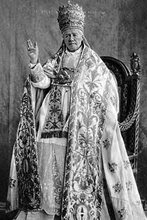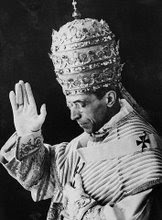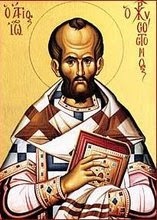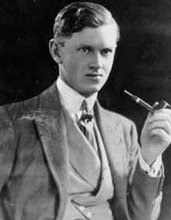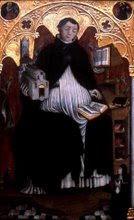The
Transition of the Blessed Virgin Mary
And
a little known privilege she received
By
Robert J. Siscoe
(Published in the August 2012 issue of Catholic Family News)
On December 8, 1854, in the Constitution Ineffabilis
Deus, Bl. Pope Pius IX defined the dogma of the Immaculate Conception of the
Blessed Virgin Mary. Many non-Catholics
mistakenly believe the Immaculate Conception refers to the virginal conception
of Jesus Christ in the womb of His mother.
In reality, the term refers to the conception of the Virgin Mary in the
womb of her mother, St. Anne. Through the
merits of Jesus Christ, the Blessed Virgin Mary received the singular privilege
of being exempt from the universal law of sin from the moment of her
conception. The dogmatic definition
reads as follows: “the most Blessed Virgin Mary … in the
first instance of her conception, by a singular privilege and grace granted by
God, in view of the merits of Jesus Christ, the Savior of the human race, was
preserved exempt from all stain of original sin".
According
to St. Thomas, sin consists in a two-fold element: a turning away from God, and
a turning toward creatures. The formal
element of original sin is the privation of original justice, by which the will
is turned away from God. The material
element of original sin is concupiscence, whereby the will is turned toward
creatures. St. Thomas wrote: “original
sin is concupiscence, materially, but privation of original justice, formally”.
(II-II Q83, A3)
At
Baptism, the formal element of original sin is removed through the infusion of
sanctifying grace and charity into the soul, but the material element remains,
and must be combated by reception of the sacraments, self denial and the
practice of virtue. By a singular
privilege, the Virgin Mary was preserved from all stain of original sin – not
only the formal element (lack of sanctifying grace), but the material element as
well. As such, the Blessed Virgin Mary was
free from concupiscence, which impedes the pure and perfect love of God, for
she was truly “full of grace” (Luke 1:28). “It was not fitting”, wrote St. Bernadine of
Sienna, “that He, the Son of God, would be born of a Virgin, and take her
flesh, were she in the slightest decree stained with original sin”.
This
privilege was granted to the Blessed Mother through the merits of her Son, our
Lord Jesus Christ, who was indeed her Savior (Luke 1:47); but unlike others who
are saved by being cleansed from sin through the merits of Christ, the Blessed
Mother was saved through His merits by being preserved from sin. In fulfillment of the prophecy of Gen. 3:15 –
“I will put enmity between thee and the woman” – the Blessed Mother was exempted
from the universal law of sin that passed onto all men due to the transgression
of Adam, the father of the human race.
It was fitting that she, who was destined to crush the head of serpent –
“she shall crush thy head” (Gen. 3:15) – should be free from all stain of sin,
so that he, whose head she will crush, would never have any place in her. Referring to the Blessed Virgin Mary, St.
John Damascene said “the serpent never had any access to this paradise”. Her Son, our Lord Jesus Christ, would have it
no other way.
Now,
since bodily death is the consequence of sin (Romans 5:12), the question arises: If the Virgin Mary was exempted from the
universal law of sin, would she also be exempt from having to suffer bodily
death?
On
November 1, 1950, in his Apostolic Constitution Munificentissimus Deus, Pope
Pius XII defined, as an article of Faith, that the Blessed Virgin Mary was assumed bodily into heaven at the end of
her life. He wrote: “we
pronounce, declare, and define it to be a divinely revealed dogma: that the
Immaculate Mother of God, the ever Virgin Mary, having completed the course of
her earthly life, was assumed body and soul into heavenly glory”.
The
question of whether or not the Blessed Mother died before being assumed into
heaven was specifically avoided in the definition, since the purpose was only
to define the Assumption. He merely
stated that she was assumed into heaven after “having completed the course of
her earthly life”. In the same document,
however, the Pope indicates, in numerous places, that the Blessed Mother did
die before being assumed into heaven, and he cites multiple sources to support
this belief. For example, he quotes the following
from the sacramentary that Pope Adrian I sent to the Emperor Charlemagne: "Venerable
to us, O Lord, is the festivity of this day on which the holy Mother of God
suffered temporal death…”, as well as the Byzantine liturgy, which says: "God,
the King of the universe, has granted you favors that surpass nature. As he
kept you a virgin in childbirth, thus he has kept your body incorrupt in the
tomb and has glorified it by his divine act of transferring it from the
tomb." He also quotes St.
Alphonsus, who wrote: “Jesus did not wish to have the body of Mary corrupted
after death…”, and St. Francis De Sales, who asked: “What son would not bring
his mother back to life and would not bring her into paradise after her death
if he could?"
There is
a solid tradition, in both the East and West, that the Blessed Mother suffered
death before being assumed into heaven.
In the eighth Century, St. John of Damascus (676-749) formulated the
tradition of the Church of Jerusalem as follows:
“St. Juvenal, Bishop of Jerusalem, at the Council of
Chalcedon (451), made known to the Emperor Marcian and Pulcheria, who wished to
possess the body of the Mother of God, that Mary died in the presence of all
the Apostles, but that her tomb, when opened, upon the request of St. Thomas,
was found empty; wherefrom the Apostles concluded that the body was taken up to
heaven”. (Catholic Encyclopedia)
In the
Mystical City of God, Ven. Mary of Agreda recounts the same events as described
above, but adds many more details, including a little-known privilege that was
granted to the Blessed Mother. The events
concerning the Transition of the Blessed Mother were revealed to her in detail:
She saw Our Lord “descend from heaven on a throne of ineffable glory,
accompanied by all the Saints and innumerable angels”. He spoke to her the following words: “My
dearest Mother, whom I have chosen for my dwelling place, the hour is come in
which thou art to pass from this life… into the glory of My Father and Mine,
where thou shalt possess the throne prepared for thee at my right hand…. And since, by my power and as my Mother, I
have caused thee to enter the world free and exempt from sin, therefore also
death shall have no right or permission to touch thee at thy exit from this
world. If thou wishest not to pass
through it, come with Me now to partake of my glory, which thou hast merited”. The blessed Mother responded: “My Son and
Lord… thou, who art my true God, hast suffered death without being obliged to
do so; it is proper that, as I have followed Thee in life, so I follow Thee
also in death”. The Lord approved of this request, and the
Blessed Mother pronounced the same words as Our Lord when He expired on the
cross – “Into thy hands, O Lord, I commend my Spirit” – then closed her eyes
and expired. In the book The Glories of
Mary, St. Alphonsus quotes Bernardine de Bustis as follows: “Mary, by a
singular privilege granted to no other Saint, loved, and was always actually
loving God, in every moment of her life, with such ardor that, as St. Bernard
declares, it required a continued miracle to preserve her life in the midst of
such flames” (pg 411). Interestingly, according to Ven. Mary of Agreda, it was
the suspension of this miracle that resulted in her death. It was revealed to her that the Blessed
Virgin Mary “died at the moment when the divine power suspended the assistance,
which until then had counteracted the sensible ardors of her burning love of
God. As soon as this miraculous
assistance was withdrawn, the fire of her love consumed the life-humors of her
heart and thus caused the cessation of her earthly existence” (Vol. 4, pgs
625-627).
The Lord
was so pleased with this final sacrifice of His mother, in choosing to follow
Him in death, that He granted her a new privilege for the benefit of her
spiritual children. The Blessed Mother explained
this privilege in the following words spoken to Ven. Mary of Agreda:
“My daughter, besides what thou hast understood and written
of my glorious Transition, I wish to inform thee of another privilege, which
was conceded to me by my divine son in that hour. Thou hast already recorded, that the Lord
offered me the choice of entering into beatific vision with or without passing
through the portals of death. … I chose death freely in order to imitate and
follow Him. … Since I had seen my Son and true God die, I would not have
satisfied the love I owe Him, if I had refused death, and I would have left a
great gap in my conformity to and my imitation of my Lord, the God-man, whereas
He wished me to bear a great likeness to Him in His most sacred humanity. …
Hence my choosing to die was so pleasing to Him, and my prudent love therein
obliged Him to such an extent, that in return, He immediately conceded to me a
singular favor for the benefit of the children of the Church… It was this, that all those devoted to me,
who should call upon me at the hour of death, constituting me as their Advocate
in memory of my happy Transition and of my desiring to imitate Him in death,
shall be under my special protection in that hour, shall have me as a defense
against the demons, as a help and protection, and shall be presented by me
before the tribunal of His mercy and there experience my intercession. In consequence the Lord gave me a new power
and commission and He promised to confer great helps of His grace for a good
death and for a purer life on all those who, in veneration of this mystery of
my precious death, should invoke my aid” (ibid. pgs. 629-630).
This
privilege, granted to the Blessed Virgin Mary, will be applied to those who
call upon her at the hour of death, in memory of her happy Transition, and the
death she willed to endure. One way to
remember this privilege, and thereby profit from it, is to form the habit of
recalling it when saying the Forth Glorious Mystery of the Rosary (the
Assumption). In addition to offering
this decade for the grace of a holy death, we should offer it in honor of the
privilege granted to the Blessed Mother, as a result of her holy death, asking
for the grace to call upon her at the hour of our death; for “they are
certainly saved and reign in heaven for whom the Queen of mercy intercedes”. (Bl.
Denis the Carthusian)
Prayer: Most
Holy Virgin Mary, Mother of God, my Mother and Advocate. In honor of thy glorious Transition and the
death you willed to endure in imitation of thy Divine Son, and in honor of the
privilege you received through your death, I beseech thee, that thou wouldst
assist me at the hour of my death, and present me to thy Divine Son, asking that
He be merciful to me, as a favor to thee.
And should I, in my final agony, forget to call upon thee, do thou, O
Most Blessed Virgin Mary, remember this prayer, and do not forget to intercede
for me. Amen.


